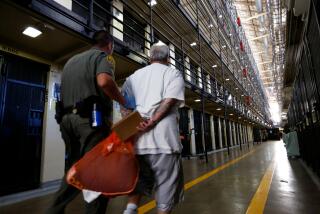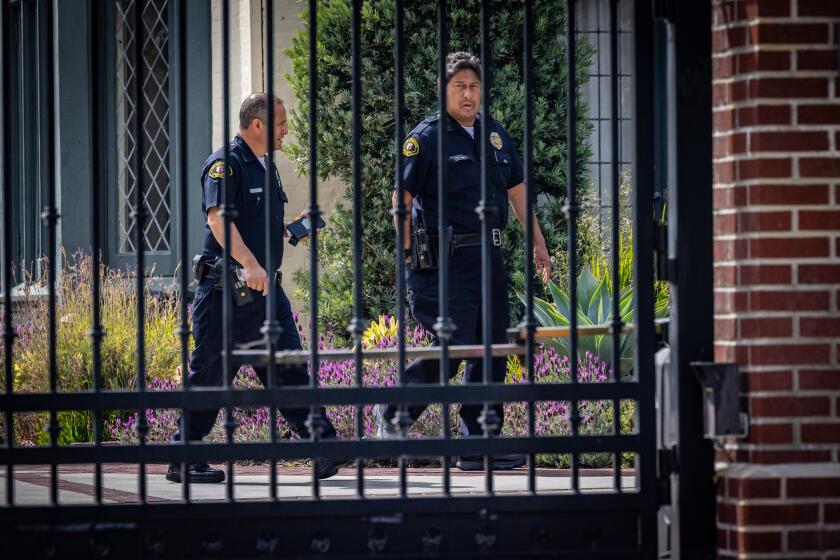Viability of sex-offender law in doubt
Law enforcement leaders who pushed for a ballot initiative requiring sex offenders in California to be tracked by satellite for life are now saying that the sweeping surveillance program voters endorsed is not feasible and is unlikely to be fully implemented for years, if ever.
Under the measure, approved overwhelmingly a year ago, sex offenders must be strapped with global positioning system devices that can record their whereabouts even after they finish parole and leave the criminal justice system.
Despite their qualms, law enforcement groups contend that the benefits of Proposition 83, popularly known as Jessica’s Law, outweigh its problems, and they insist that many of the flaws can be fixed. But in interviews and testimony to a state board, they have cited complications with almost every aspect of the provision requiring lifetime monitoring.
The difficulties include the impracticality of tracking sex offenders who no longer must report to parole or probation officers, the lack of any penalty for those who refuse to cooperate with monitoring and the question of whether such widespread tracking is effective in protecting the public.
The biggest issue, however, is that the law does not specify which agency or government should monitor felony sex offenders -- and shoulder hundreds of millions of dollars a year in related costs.
Only a small percentage of the 65,000 sex offenders thought to be living in communities throughout the state are subject to the law, but the numbers are expected to grow by thousands every year as more offenders are released from prison.
As a result, Gov. Arnold Schwarzenegger and state law enforcement leaders, who were allied in backing the measure, are engaged in a standoff over who should bear its financial burden.
“I don’t know of any agency that has the resources to track and monitor . . . in real time,” said Vacaville Police Chief Richard Word, president of the California Police Chiefs Assn. “You’ll need an air traffic controller to track these folks.”
Word and other law enforcement leaders said the global positioning system satellite technology probably would never be used for full-time electronic surveillance of sex offenders as the law suggests. They said GPS is more effective for acting on tips about potential crimes or investigating incidents that have already occurred than for blanket monitoring that reveals a location as a blip on a map but not what the subject is doing there.
The state’s new Sex Offender Management Board, which began meeting during the summer, is taking testimony from local officials and others for a report due in January on how the law works in practice and what changes might need to be made.
“We’ve heard significant concerns with how monitoring would be implemented and how it would be paid for,” Suzanne Brown-McBride, the board’s chairwoman, said in an interview.
Sensitive issue
Criticizing the law is a sensitive matter because 70% of voters endorsed Proposition 83, an indication of strong public sentiment in favor of harsh treatment for sex offenders. Schwarzenegger, former state Atty. Gen. Bill Lockyer and law enforcement groups throughout the state supported the measure, and public officials have been reluctant to acknowledge its faults.
Tom Tobin, a psychologist who works with sex offenders and sits on the state board, said the law’s defects are like the fabled emperor’s new clothes: Everyone is afraid to state the obvious.
“We are in the jungle -- totally uncharted territory, legally and every other way,” Tobin said at a recent board meeting.
Though they have not yet published their findings, some members of the state board already appear disenchanted with the law.
Janet Gaard, an assistant state attorney general, told colleagues that Proposition 83 appeared to be “a flawed law,” and that its former supporters could still correct the public’s misunderstanding of it if they were to mount a new campaign.
“We have the ability to persuade the public and say, ‘Maybe we made a mistake,’ ” Gaard said.
The state corrections department is the only California agency enforcing the GPS requirement, with an intensive and expensive caseload of 20 sex offenders for each parole agent.
Even so, corrections officials have not been able to get their program fully up and running yet. They say that of the roughly 3,000 offenders who are supposed to be monitored, about 2,000 are wearing the devices, and the number of eligible is rising quickly: State officials say 500 to 700 more sex offenders leave prison each month and become subject to the law.
Corrections analysts estimate that it costs the state up to $33 a day in equipment and labor to monitor a sex offender by GPS, and it would take nearly $90 million a year just to track the 9,000 now on parole if all were subject to Proposition 83.
Once offenders are discharged from parole, the state will no longer monitor them electronically, Corrections Secretary James Tilton said last month, because his department lacks jurisdiction at that point. The agency also is overextended, with an overcrowded prison system under review by the federal courts.
Nick Warner, a lobbyist and spokesman for the California State Sheriffs’ Assn., said the state’s refusal to monitor sex offenders after parole “passes the buck to local law enforcement, who are not equipped to handle them.” He said the state was “setting up communities to fail” and predicted that the matter would end up in court.
Schwarzenegger, who faces a $10-billion state budget gap next year, said through spokesman Bill Maile that he would wait for the sex offender board to address the question of who should fund lifetime GPS tracking before taking a position on the issue.
Maile said the governor would coordinate with local officials to make “whatever fixes are necessary to carry out the will of the voters.”
State Sen. George Runner (R-Lancaster), one of the law’s authors, has said he intended for the state to pay the tab. Runner, a frequent critic of government spending, tucked a clause into the end of an unrelated initiative he proposed this month that would require the state to reimburse local governments for all GPS monitoring, including for sex offenders. That measure is not in circulation yet.
Apart from the funding question is the issue of how to track sex offenders for life.
Not equipped for the job
At the sex offender board’s recent meeting, Chief Carey Sullivan of the Woodland Police Department testified that local police and sheriff’s deputies are not trained to monitor criminals the way parole agents or probation officers do.
Sullivan, speaking on behalf of state police chiefs, said the problem with enforcing lifetime GPS tracking is that the law provides no sanctions if offenders cut the units from their ankles or refuse to keep them charged after leaving parole.
If a sex offender travels from one city to another, or outside the state -- as they are free to do once dismissed from parole -- it would be “tremendously difficult” for local authorities to continue to track them where they have no jurisdiction, he said.
Overall, Sullivan said, GPS is “just one tool in a very large tool bag” and does not enable police to exert complete control over sex offenders.
“I think that is an extremely misleading perception that people have,” he said. “We would have been far better off with lifetime parole or probation than . . . with lifetime GPS.”
In an informal survey by the Chief Probation Officers of California presented by Jerry Powers, head of probation in Stanislaus County and a member of the sex offender board, only five of 37 agencies that responded reported using GPS at all, and in very low numbers. Orange County reported that it had only 15 devices, and Stanislaus reported 10.
Powers said some would like to use GPS for other offenders, such as gang members.
Powers told his colleagues that it would be “ludicrous” to think that local agencies would voluntarily monitor all sex offenders by satellite.
“It would bankrupt any of our systems very quickly,” he said.
More to Read
Start your day right
Sign up for Essential California for news, features and recommendations from the L.A. Times and beyond in your inbox six days a week.
You may occasionally receive promotional content from the Los Angeles Times.






